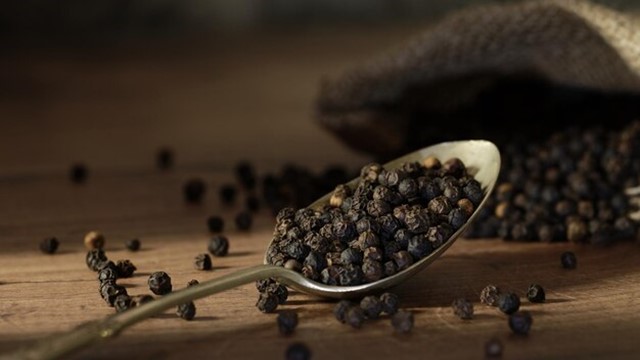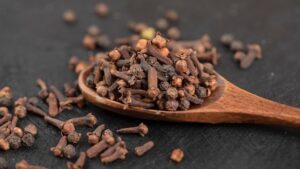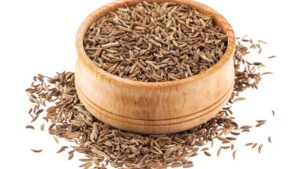Black pepper is a highly popular spice derived from the berries of the Piper nigrum vine, which is native to India’s Malabar Coast. It is widely used in cuisines across the world and is renowned for its pungent flavor and aromatic qualities. Here are details about black pepper:

Botanical Origin:
Black pepper, scientifically known as Piper nigrum, belongs to the Piperaceae family. It is a flowering vine that produces berries known as peppercorns. The vine is native to the tropical regions of Southern India’s Malabar Coast, but it is also cultivated in other parts of the tropics, including Indonesia, Vietnam, Brazil, and other Southeast Asian countries.
The Piper nigrum vine grows as a climbing perennial plant that requires support, typically utilizing trees or poles. Its dark green leaves are heart-shaped and glossy, and it produces small white flowers that develop into berries. These berries, harvested at different stages of maturity, yield different types of peppercorns, such as black, white, and green, each with its unique flavor and culinary uses.
Black pepper specifically comes from the unripe, green berries of the Piper nigrum vine. These berries are harvested and dried, resulting in the characteristic wrinkled, dark-colored peppercorns we commonly recognize and use in cooking.
The cultivation of black pepper requires a warm, humid climate and well-drained soil. It thrives in areas with temperatures between 75-85°F (24-29°C) and requires adequate rainfall. The cultivation and trade of black pepper have historically been significant, influencing cultural exchange, trade routes, and economic development in various regions across the globe.
Varieties
There are several varieties of black pepper, each with its unique characteristics, flavors, and origins. These varieties are often distinguished by their growing regions, processing methods, and the specific type of peppercorn produced. Some of the notable varieties of black pepper include:
Tellicherry Pepper:
Tellicherry peppercorns are considered some of the finest and largest black peppercorns available. They are harvested from the Malabar region of Kerala, India. Known for their bold and robust flavor, Tellicherry peppercorns are left to ripen longer on the vine, allowing them to develop a complex flavor profile.
Malabar Pepper:
This variety also hails from the Malabar Coast in Kerala, India. It’s similar to Tellicherry pepper but might be harvested earlier, resulting in a slightly milder taste compared to Tellicherry.
Lampong Pepper:
Lampong pepper comes from Indonesia, specifically the region of Lampung in Sumatra. It is known for its strong aroma and medium heat, making it a popular choice in Indonesian cuisine.
Sarawak Pepper:
Grown in the Malaysian state of Sarawak in Borneo, Sarawak pepper is characterized by its mildly fruity flavor and medium heat. It’s considered a high-quality pepper variety.
Vietnamese Pepper: Vietnam is a significant producer of black pepper. Vietnamese pepper tends to be bold, spicy, and pungent with a slightly different flavor profile compared to other varieties.
Brazilian Pepper:
Brazil also cultivates black pepper, and its variety often exhibits a slightly different taste profile owing to the local climate and soil conditions.
Each of these varieties might have subtle differences in taste, aroma, and appearance due to factors such as growing conditions, harvesting techniques, and regional characteristics. The choice of pepper variety can impact the overall flavor of dishes and is often a matter of personal preference and the culinary application in which it is used.
Flavor and Aroma:
Black pepper is renowned for its distinctive flavor and aroma, which are key elements contributing to its widespread use in culinary applications. Here’s an overview of its flavor and aroma:
Flavor:
- Pungency: Black pepper is notably pungent, imparting a sharp and biting sensation on the palate. This pungency comes from the presence of a compound called piperine, which is responsible for the spice’s intense taste.
- Peppery Heat: It delivers a warming sensation when consumed, often described as a peppery heat that tingles the taste buds and adds depth to dishes.
- Earthy and Robust: Alongside its heat, black pepper offers earthy and robust undertones. These elements contribute to the complexity of its flavor profile, especially in savory dishes.
- Subtle Floral Notes: In addition to its boldness, there might be subtle floral notes in black pepper, especially in high-quality varieties like Tellicherry or certain regional types. These nuances can vary depending on the variety and freshness of the peppercorns.
Aroma:
- Robust Aroma: The aroma of black pepper is strong and robust, instantly recognizable due to its pungent and sharp fragrance.
- Aromatic Compounds: Beyond its spiciness, black pepper emits a distinct fragrance owing to various aromatic compounds present in the peppercorns. These compounds contribute to its overall aroma and can vary depending on factors like origin and processing.
- Warm and Inviting: The aroma of freshly ground black pepper is often described as warm, inviting, and capable of enhancing the olfactory experience of a dish.
The combination of its pungent, spicy heat with earthy undertones and a robust aroma makes black pepper a versatile spice that enhances the flavor profile of a wide range of culinary creations, from savory dishes to certain desserts and beverages. The intensity of its flavor and aroma can vary based on factors like the freshness of the pepper, the variety used, and the method of preparation.
Culinary Uses
Black pepper is a versatile spice used extensively in various cuisines around the world. Its distinctive flavor and aroma make it a staple in many kitchens. Here are some common culinary uses of black pepper:
- Seasoning: It is widely used as a seasoning to enhance the taste of savory dishes. Sprinkling freshly ground black pepper on meats, poultry, fish, and vegetables before or after cooking adds depth and a spicy kick to the flavors.
- Soups and Stews: Black pepper is a common ingredient in soups, stews, and broths. It adds warmth and depth to these dishes, contributing to the overall flavor profile.
- Sauces and Marinades: It’s a key ingredient in various sauces and marinades, whether for grilling, roasting, or marinating meats. Black pepper complements other spices and ingredients, enhancing the overall taste.
- Salad Dressings: It’s often included in salad dressings, providing a subtle heat and complexity to vinaigrettes and creamy dressings.
- Eggs and Breakfast Dishes: Black pepper is frequently used to season eggs, whether scrambled, fried, or in omelets. It’s also added to breakfast items like hashes and frittatas for added flavor.
- Pasta and Rice Dishes: It’s a popular seasoning in pasta sauces, risottos, and rice dishes, bringing warmth and depth to these meals.
- Baking: In certain baked goods, particularly recipes like savory bread, biscuits, and crackers, a touch of black pepper can add an interesting contrast and depth of flavor.
- Preservation: Historically, black pepper was used as a preservative due to its antibacterial properties. Though less common now, it’s still utilized in some preserved foods.
When using black pepper in dishes, many chefs prefer freshly ground pepper for its optimal flavor. It’s also essential to consider the quantity used, as the spice can vary in intensity, and its heat level might differ based on the type and freshness of the peppercorns.
Black pepper is a fundamental spice in the culinary world, valued for its ability to enhance and complement a wide array of dishes, from simple home-cooked meals to intricate gourmet cuisine.
Health Benefits
Black pepper offers several potential health benefits, largely attributed to its active compound, piperine, along with other compounds present in the peppercorns. Some of the potential health benefits associated with black pepper include:
- Enhanced Nutrient Absorption: Piperine in black pepper has been linked to improved absorption of nutrients, such as vitamins (like vitamin B and beta-carotene) and minerals, by enhancing the bioavailability of these nutrients in the body.
- Digestive Aid: Black pepper may support digestive health by stimulating the secretion of digestive enzymes in the pancreas and aiding in proper digestion. It can potentially help alleviate digestive discomfort.
- Antioxidant Properties: Some studies suggest that piperine in black pepper may possess antioxidant properties, helping to combat oxidative stress in the body and reduce the damage caused by free radicals.
- Anti-inflammatory Effects: Piperine has been investigated for its potential anti-inflammatory properties. It may help reduce inflammation and related symptoms, although further research is needed to confirm its efficacy in this regard.
- Potential Weight Management: There’s some research indicating that piperine might influence metabolism and fat cells, potentially assisting in weight management. It could help in controlling fat accumulation and improving metabolic function, although more studies are required to establish its effectiveness conclusively.
- Brain Health: Piperine might have a positive impact on brain health. Some research suggests that it could enhance cognitive function and protect against neurodegenerative conditions, though further studies are necessary to validate these effects.
- Antibacterial Properties: Historically, black pepper was used for its antibacterial properties. Piperine may exhibit some antimicrobial activity against certain types of bacteria.
It’s important to note that while black pepper offers potential health benefits, these effects might vary based on factors such as the amount consumed, individual health conditions, and overall diet. Consuming black pepper in culinary amounts as part of a balanced diet is generally considered safe for most people.
However, concentrated supplements or extracts of black pepper, particularly those containing high levels of piperine, should be used cautiously and under guidance, as they may interact with medications or have adverse effects in certain individuals.
Always consult a healthcare professional or a registered dietitian for personalized advice and to understand how black pepper consumption might specifically impact your health or interact with any existing medical conditions or medications.
Storage:
Proper storage of black pepper is crucial to maintain its flavor, aroma, and quality over time. Here are some guidelines for storing black pepper:
- Container: Store black pepper in an airtight container to protect it from air, moisture, and light, which can degrade its flavor. A glass or metal container with a tight-sealing lid works well.
- Location: Keep the container of black pepper in a cool, dry, and dark place. Direct sunlight can cause flavor loss and deterioration.
- Whole Peppercorns vs. Ground Pepper: Whole peppercorns generally retain their flavor and aroma longer than pre-ground pepper. If possible, it’s advisable to grind peppercorns just before use to maintain maximum freshness and flavor.
- Avoid Heat and Humidity: High temperatures and humidity can adversely affect the quality of black pepper. Avoid storing it near the stove, oven, or any area where it might be exposed to heat or moisture.
- Duration: While whole peppercorns can retain their quality for a longer time, ground pepper tends to lose its flavor relatively quickly. For optimal taste, use ground black pepper within a few months to ensure freshness.
- Refrigeration or Freezing: Black pepper doesn’t require refrigeration or freezing if stored properly in a cool, dry place. However, if you live in a particularly humid environment, storing it in the refrigerator can help prolong its shelf life.
- Quality Check: Over time, black pepper might lose some of its potency and aroma. If you notice a significantly reduced aroma or flavor, it might be time to replace it with a fresh batch.
By following these storage guidelines, you can help preserve the quality of black pepper and ensure that it retains its flavor and aroma for an extended period, allowing you to enjoy its culinary benefits to the fullest.




